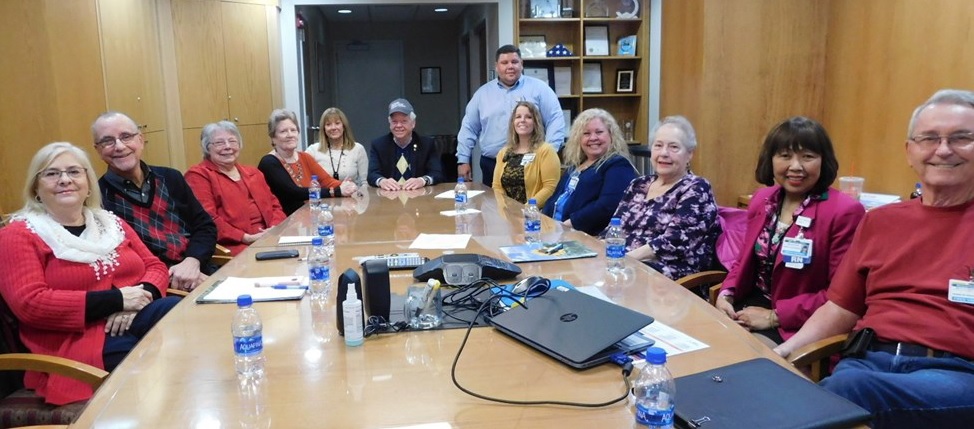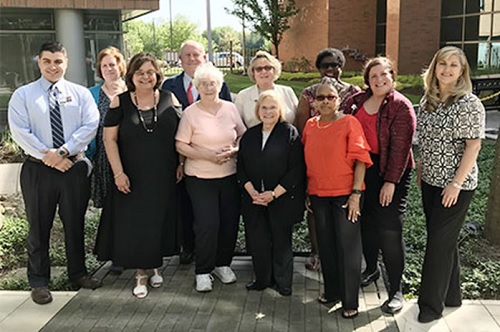Patient and Family Advisory Councils Improve Safety, Quality and the Patient Experience
Working Together to Serve You Better
Patient and Family Advisory Councils (PFACs) are a proven approach for health care organizations to form a partnership that improves patient and family experiences. A PFAC is a group of current and former patients, families and hospital staff who collaborate on ways to improve the patient experience and quality of care.
RWJBarnabas Health has embraced PFACs to learn from patients' diverse perspectives and firsthand experiences, and integrate their ideas into service delivery and quality improvement efforts.
This approach can positively impact care and assist with strengthening the delivery of patient- and family-centered care. PFACs often play a key role in implementing change.
The various RWJBarnabas Health PFAC members work closely with each site's Patient Experience Team connecting the patients and families with medical staff, clinicians and administrators as partners to improve the delivery of care. The need for extra safety measures is especially critical during the pandemic, and our collaborative efforts are ensuring that we provide exceptional care. The Leapfrog Group, an independent national nonprofit that measures hospital quality and patient safety nationwide, recognized our Patient Experience Team with a "Special Recognition for Heroism During the Pandemic," for their above-and-beyond efforts to keep patients' loved ones connected and informed through virtual visits.
The Leapfrog Group, a hospital quality and safety watchdog organization, recognized our Patient Experience Team, which organizes the PFACs at each site, with "Special Recognition for Heroism During the Pandemic."
A PFAC at Every RWJBarnabas Health Hospital

In 2018, an RWJBarnabas Health system-wide goal called for all hospitals to have an established PFAC.
Council membership had to be composed of patients and their immediate and extended family members from diverse backgrounds who have recently received treatment at one of our RWJBarnabas Health sites.
The ratio of patient and family to staff is typically at least 3:1, with the staff representing different levels from clinical and non-clinical service areas with a Patient Experience and/or nurse leader co-leading the meeting in conjunction with a patient and family representative.
Since the establishment of each council there has been ongoing recruitment held.
Within the system, PFAC members serve on Quality Committees and assist in conducting patient rounds.
Many of our PFAC members are also hospital volunteers who spent a large portion of their time focusing their attention on patient needs both physical and emotional.
Some PFAC members were instrumental in implementing the Hand Hygiene Task Force and executing the AIDET (Acknowledge, Introduce, Duration, Explanation, Thank You) Badge Buddy initiative. Using the AIDET system of addressing patients augments feelings of compassion and empathy, reduces patient anxiety, helps build therapeutic relationships, and ultimately improves patient health outcomes, both physical and emotional. The Badge Buddy initiative is a part of that; we have added the AIDET components to our name badges to serve as a quick reference guide.
Focus on Patient- and Family-Centered Care
PFACs at each of our RWJBH sites allow patients and their loved ones to have direct impact on the coordination of care while offering the perspective of the patient and loved ones. The PFACs promote a culture of patient- and family-centered care and helps to improve programs, services and policies within the organization.
The mission of each RWJBarnabas Health PFAC is to empower advisory council members and to collaborate with leadership and staff to provide input, ideas and improvements on organizational policies and practices.
The councils support the organization’s mission of “Creating Healthy Communities” and promote patient- and family-centered care by putting the patient and family at the center of all we do.
The term “patient- and family-centered care” emphasizes collaboration with patients and families of all ages, at all levels of care and in all health care settings. The involvement of patients' family and loved ones are essential to the patients' health and wellbeing and necessary partners for quality and safety improvements within the health care system.
“As a PFAC [Patient and Family Advisory Council] member, I have gained a new appreciation for the operation of the hospital and how the community can help make the patient experience even better. . . . Now I know the hospital administration and PFAC members are listening and working on issues that affect all of us.” —A PFAC Member
Quality and Continuous Improvement

- Cultivate respectful, welcoming partnerships between patients, families, leadership and staff
- Encourage collaboration between families and patient care providers
- Strengthen communication between patients, families, leadership and staff
- Channel information and concerns from patients and families to organizational leadership
- Offer effective solutions to patient and family concerns
- Provide education and training that fosters an increased understanding of the patient- and family-centered care values throughout the organization and community
- Provide input for clinical programs to meet patient and family needs
- Provide recommendations on operational issues that affect patients and families
Expectations and Goals of RWJBarnabas Health’s PFACs

There are a number of goals that the PFACs of RWJBarnabas strive to accomplish. The various councils’ goals include ongoing encouragement of a more patient-centered delivery of care by improving patient satisfaction and working with staff to improve services that affect patients and family members.
The system’s councils also strive to improve the quality and safety of care by addressing the concerns and needs of patients and their loved ones — as well as staff members — that surface during rounds, as well as any other topics that arise given their involvement with our Quality and/or Safety Committees.
In 2019, one goal of PFACs across the system was to screen, orient and place two PFAC members on at least one Quality and/or Safety Committee at each hospital. As a result, here are the various committees that our PFAC members across the RWJBH system serve on:
- Bioethics Committee
- LGBTQ Business Group
- Quality Board Committee
- Infection Control Committee
- Patient Falls Committee
- Safety Committee
- Performance Improvement Committee
- Hospital Board
- Patient Experience and Safety Rounding Committee
- Pre-Bone Marrow Transplant Education
- Pediatric Committee
- Multidisciplinary NICU Committee
- Palliative Care Committee
- Hand Hygiene Task Force
- Environment of Care Committee
For More Information
- Children's Specialized Hospital — 732-285-7142
- Clara Maass Medical Center — 973-450-2177
- Community Medical Center — 732-557-8078
- Cooperman Barnabas Medical Center — 973-322-5459
- Jersey City Medical Center — 201-915-2977
- Monmouth Medical Center — 848-923-6671
- Monmouth Medical Center Southern Campus — 732-886-4600
- Newark Beth Israel Medical Center — 973-926-7180
- Robert Wood Johnson University Hospital Hamilton — 609-584-6550
- Robert Wood Johnson University Hospital — 732-828-3000 x8501
- Robert Wood Johnson University Hospital Rahway — 732-499-6136
- Robert Wood Johnson University Hospital Somerset — 908-685-2430
- The Bristol-Myers Squibb Children's Hospital at Robert Wood Johnson University Hospital — 732-253-3135
- RWJBarnabas Health Behavioral Health Center — 732-914-3805
- Barnabas Health Outpatient Center — 973-322-7292




